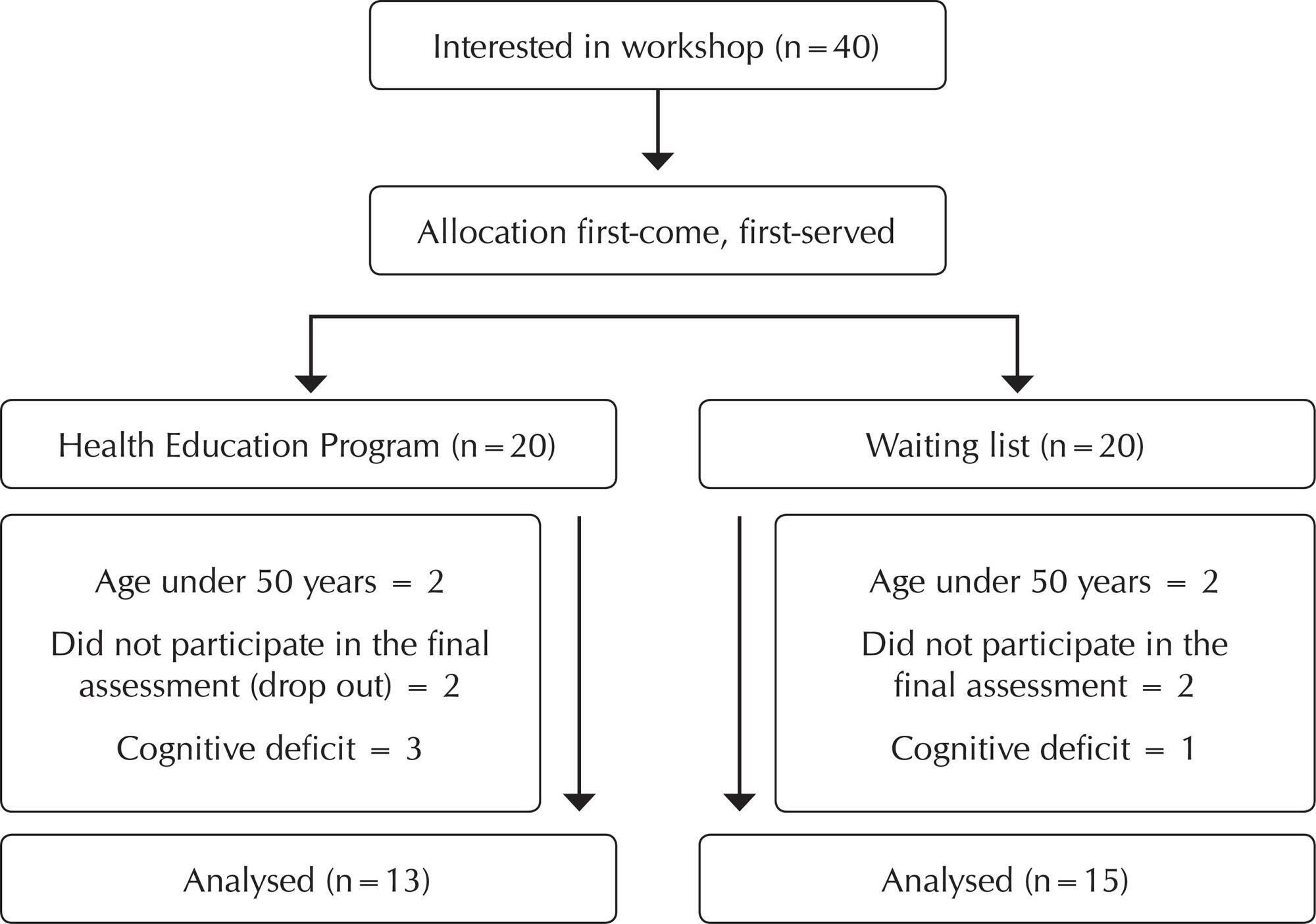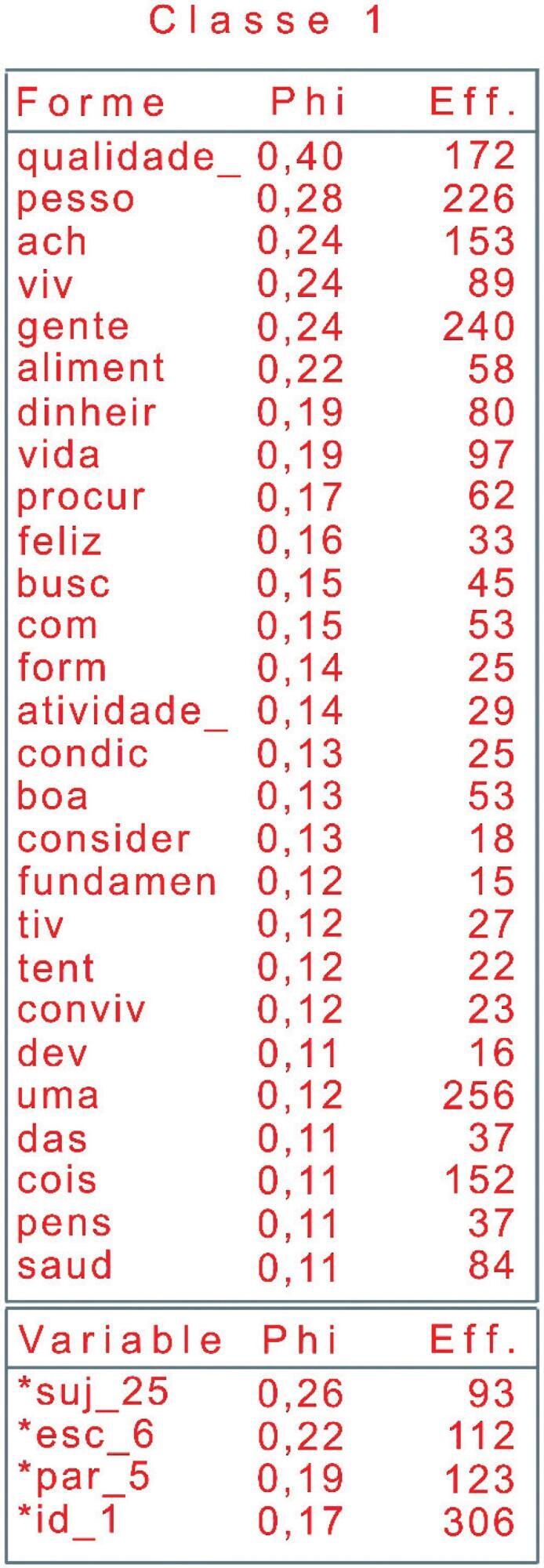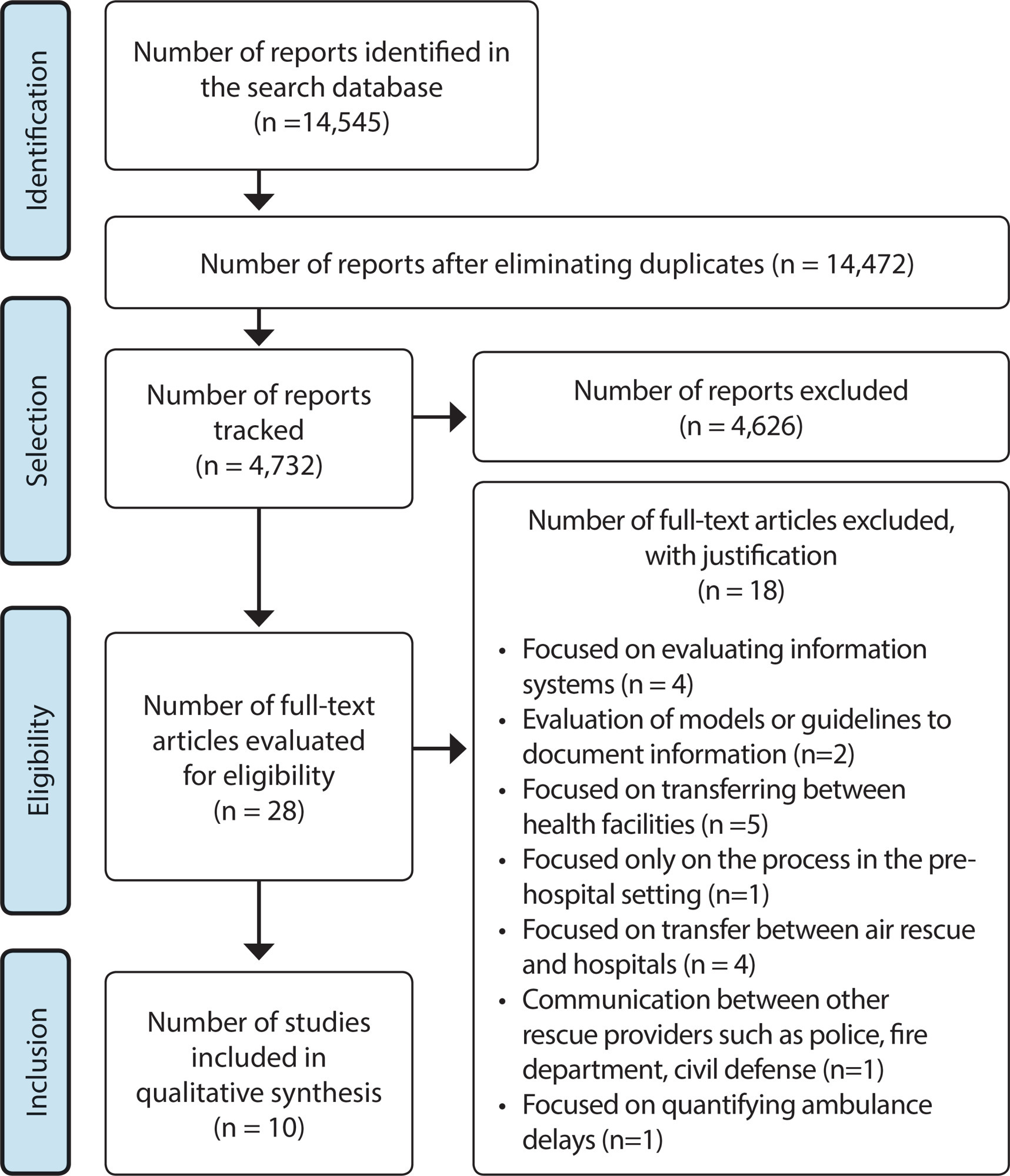-
RESEARCH01-01-2017
Urinary tract infection: a cohort of older people with urinary incontinence
Revista Brasileira de Enfermagem. 2017;70(4):838-844
Abstract
RESEARCHUrinary tract infection: a cohort of older people with urinary incontinence
Revista Brasileira de Enfermagem. 2017;70(4):838-844
DOI 10.1590/0034-7167-2017-0141
Views0ABSTRACT
Objective:
To evaluate epidemiological aspects of urinary tract infection in older patients with urinary incontinence living in long-term care institutions in Belo Horizonte. Method: Concurrent cohort held from April 1st to October 1st, 2015. The study was conducted in two long-term care institutions in the city of Belo Horizonte, Minas Gerais, with 84 incontinent older people.
Results:
Cumulative incidence of urinary tract infection was 19% (95% CI: 7.83-23.19) and the incidence density was 3.6 cases/100 people-month of follow-up period. The variables Bacteriuria and Institution presented statistical association with the occurrence of urinary tract infection.
Conclusion:
It is observed that the incidence of urinary tract infection in the study was smaller than in other similar international and national studies, however this is an important world health problem for the older population, with impact on mortality of these individuals.
Keywords:Long-term Care Institution for the Older PopulationNursingOlder PeopleUrinary IncontinenceUrinary InfectionsSee more -
RESEARCH01-01-2017
Geriatric care: ways and means of providing comfort
Revista Brasileira de Enfermagem. 2017;70(4):830-837
Abstract
RESEARCHGeriatric care: ways and means of providing comfort
Revista Brasileira de Enfermagem. 2017;70(4):830-837
DOI 10.1590/0034-7167-2016-0636
Views0See moreABSTRACT
Objective:
To know the ways and means of comfort perceived by the older adults hospitalized in a medical service.
Method:
Ethnographic study with a qualitative approach. We conducted semi-structured interviews with 22 older adults and participant observation of care situations.
Results:
The ways and means of providing comfort are centered on strategies for promoting care mobilized by nurses and recognized by patients(clarifying/informing, positive interaction/communication, music therapy, touch, smile, unconditional presence, empathy/proximity relationship, integrating the older adult or the family as partner in the care, relief of discomfort through massage/mobilization/therapy) and on particular moments of comfort (the first contact, the moment of personal hygiene, and the visit of the family), which constitute the foundation of care/comfort.
Final considerations:
Geriatric care is built on the relationship that is established and complete with meaning, and is based on the meeting/interaction between the actors under the influence of the context in which they are inserted. The different ways and means of providing comfort aim to facilitate/increase care, relieve discomfort and/or invest in potential comfort.
-
RESEARCH01-01-2017
Effects of a Health Education program on cognition, mood and functional capacity
Revista Brasileira de Enfermagem. 2017;70(4):814-821
Abstract
RESEARCHEffects of a Health Education program on cognition, mood and functional capacity
Revista Brasileira de Enfermagem. 2017;70(4):814-821
DOI 10.1590/0034-7167-2016-0638
Views0See moreABSTRACT
Objective:
Assess the effect of a Health Education (HE) program on cognition, mood and functional capacity of participants in a University of The Third Age (U3A).
Method:
Controlled clinical trial. The HE Program consisted of 10 sessions with group dynamics, including orientations on disease prevention and cognitive stimulation exercises, lasting four months. Intervention Group (IG) n=13; and Control Group (CG) n=15. All were assessed at the start and end of the study, using Addenbrook´s Cognitive Examination-Revised (ACE-R), Beck Depression and Anxiety Inventory (BDI/BAI) and Functional Independence Measure (FIM).
Results:
Significant improvements were observed for the IG when comparing the total ACE-R score (p=0.001) and memory domain (p=0.011) before and after the intervention. For the CG, improvement was found in the memory domain only (p=0.027).
Conclusion:
a HE intervention program benefits the improvement in cognitive performance, particularly the memory of adults and active elderly who participated in a U3A.

-
Efeitos de um programa de Educação em Saúde na cognição, humor e capacidade funcional
Revista Brasileira de Enfermagem. 2017;70(4):814-821
Abstract
Efeitos de um programa de Educação em Saúde na cognição, humor e capacidade funcional
Revista Brasileira de Enfermagem. 2017;70(4):814-821
DOI 10.1590/0034-7167-2016-0638
Views0See moreRESUMEN
Objetivo:
Evaluar los efectos de la Educación para la Salud (ES) en la cognición, humor y capacidad funcional de participantes de una Universidad Abierta de la Tercera Edad.
Método:
Se trata de un ensayo clínico controlado. El Programa de Educación para la Salud consistió en 10 sesiones con dinámicas de grupo, con orientaciones sobre prevención de enfermedades y ejercicios de estimulación cognitiva, con duración de 4 meses. Participaron 13 personas en el grupo de intervención (GI) y 15 en el grupo control (GC). Todos fueron evaluados al inicio y al término del estudio con los instrumentos Addenbrook´s Cognitive Examination-Revised (ACE-R), Inventario de Depresión y Ansiedad de Beck (BDI/BAI) y con la Medida de la Independencia Funcional (FIM).
Resultados:
se observaron mejoras significativas en el GI cuando se compararon los resultados del ACE-R (p=0,001) y el dominio de la memoria (p=0,001) antes y después de la intervención. Para el GC fue encontrada una mejora significativa solamente en el dominio de la memoria (p=0.027).
Conclusión:
Los resultados sugieren que la intervención educativa estudiada tiene efecto beneficioso en el desempeño cognitivo de los participantes de la Universidad Abierta de la Tercera Edad.
-
RESEARCH01-01-2017
Social representations of older adults regarding quality of life
Revista Brasileira de Enfermagem. 2017;70(4):806-813
Abstract
RESEARCHSocial representations of older adults regarding quality of life
Revista Brasileira de Enfermagem. 2017;70(4):806-813
DOI 10.1590/0034-7167-2017-0097
Views0See moreABSTRACT
Objective:
to identify the social representations of older adults regarding quality of life, and to analyze the care practices adopted to promote it.
Method:
qualitative, exploratory, descriptive research, applying the Theory of Social Representations. Thirty older people from a Health Academy of Rio de Janeiro participated in the study. The software Alceste was used, and lexical analysis of data was performed.
Results:
social representations of quality of life are based on the social determinants of health; they evidence knowledge and practices of care by valuing physical activities. The practices promoting quality of life comprise healthy eating habits, daily physical exercise, social participation, interaction and socialization, accomplishment of leisure activities and daily tasks with independence and autonomy, and support and family contact.
Final considerations:
the elderly have a global understanding of the concept of quality of life, coordinate knowledge built in daily life and knowledge coming from the technical-professional field, which evidences the multidimensionality of the concept.

-
RESEARCH01-01-2017
Nursing diagnosis in older adults with chronic kidney disease on hemodialysis
Revista Brasileira de Enfermagem. 2017;70(4):800-805
Abstract
RESEARCHNursing diagnosis in older adults with chronic kidney disease on hemodialysis
Revista Brasileira de Enfermagem. 2017;70(4):800-805
DOI 10.1590/0034-7167-2017-0117
Views0See moreABSTRACT
Objective:
To identify the main nursing diagnoses (NSs) in older adult patients under hemodialysis treatment.
Method:
Exploratory research using case studies in data collection performed by interview and physical examination of older adults, in the first semester of 2016. Were included twenty-eight older adults undergoing chronic hemodialysis treatment who met the selection criteria. The analysis followed two steps (RISNER, 1990): Phase I – Data analysis and synthesis; and Phase II – Establishment of nursing diagnoses using the taxonomy of NANDA-I (2015).
Results:
The total of NSs was 110, averaging 3.9 per patient. It was listed seven different NSs, and both the Risk of infection and the Volume of excessive liquids appeared on all patients (28; 100%), and risk of electrolyte imbalance, in 26 (96.8%) older adults, being considered as main NSs.
Conclusion:
Such results can help systematize the care of older people who are undergoing hemodialysis treatment.
-
RESEARCH01-01-2017
Health education with older adults: action research with primary care professionals
Revista Brasileira de Enfermagem. 2017;70(4):792-799
Abstract
RESEARCHHealth education with older adults: action research with primary care professionals
Revista Brasileira de Enfermagem. 2017;70(4):792-799
DOI 10.1590/0034-7167-2016-0349
Views0See moreABSTRACT
Objective:
To assess the development and implementation of permanent education action.
Method:
Quantitative-qualitative research based on action research in three phases (diagnosis of reality, implementation of activity and evaluation), performed with health professionals and managers of basic health units. The evaluation was on the perception of changes immediately following the activity and after 120 days.
Results:
In the first phase, 110 professionals took part, 36.4% of whom indicated the existence of groups for older adults at work. In the second phase, 98 professionals participated, pointing out interferences of the group in the life of older adults, items of importance and facilitation in forming groups and developing reality-based activities. The third phase showed, in the quantitative analysis, positive impact of the training, and in the qualitative analysis, reassessment of groups, greater knowledge and confidence in managing groups and increased respect for older adults.
Final considerations:
Permanent education opens pathways for the construction of differentiated care for older adults based on respect and health promotion.

-
EDITORIAL03-08-2024
Nursing as a player in tackling vaccine hesitancy and refusal
Revista Brasileira de Enfermagem. 2024;77:e77suppl101
Abstract
EDITORIALNursing as a player in tackling vaccine hesitancy and refusal
Revista Brasileira de Enfermagem. 2024;77:e77suppl101
DOI 10.1590/0034-7167.202477suppl101
Views1Since the 1970s, the Brazilian Ministry of Health established the Brazilian National Immunization Program (PNI – Programa Nacional de Imunização), which preceded the Brazilian Health System and which was incorporated and strengthened due to the decentralized model to municipalities, but under single command at central level. Its objective was and still is to coordinate vaccination […]See more -
REVIEW12-21-2020
Communication between pre-hospital and intra-hospital emergency medical services: literature review
Revista Brasileira de Enfermagem. 2020;73:e20190817
Abstract
REVIEWCommunication between pre-hospital and intra-hospital emergency medical services: literature review
Revista Brasileira de Enfermagem. 2020;73:e20190817
DOI 10.1590/0034-7167-2019-0817
Views1ABSTRACT
Objectives:
to analyze, according to the scientific literature, communication strategies in the transfer of cases between pre-hospital and in-hospital services and their contributions to patient safety.
Methods:
this is a literature review study, that is, one that aims to gather and synthesize research results on the subject in a systematic and orderly manner.
Results:
ten articles were published, published between 2010 and 2018, and two points of discussion emerged: use of mnemonics; and barriers to transferring a case.
Conclusions:
studies point to the need to standardize the case transfer process, as well as integrative training of professionals, regular assessment of the teams involved in emergency medical services and the need for research on the subject.
Keywords:AmbulanceCommunicationEmergency Medical ServicesReviewTransfer of Responsibility by the PatientSee more
-
ORIGINAL ARTICLE09-16-2019
Spatial analysis on tuberculosis and the network of primary health care
Revista Brasileira de Enfermagem. 2019;72(5):1197-1202
Abstract
ORIGINAL ARTICLESpatial analysis on tuberculosis and the network of primary health care
Revista Brasileira de Enfermagem. 2019;72(5):1197-1202
DOI 10.1590/0034-7167-2017-0897
Views1See moreABSTRACT
Objective:
to analyze the spatial distribution of new cases of tuberculosis compared to the location of the Primary Healthcare Units that performed the compulsory notification.
Method:
ecological study conducted in Belém, Pará, with 5,294 new cases of tuberculosis notified to Sistema de Informação de Agravos de Notificação for the period from 2010 to 2014. The cases were georeferenced using the software applications ArcGis 10.2 and TerraView 4.2.2. The techniques of Kernel density and global Moran geostatistics were used.
Results:
the incidence of tuberculosis cases did not vary significantly between the years studied, however there was a variation in incidence between neighborhoods. Health units that exhibited higher number of notifications can suffer great influence of migration from nearby neighborhoods.
Conclusion:
the spatial dynamics of tuberculosis associated with health services allows to know the areas with increased risk of tuberculosis and the density of notifications of health units.

-
ORIGINAL ARTICLE10-21-2019
Nurses defending the autonomy of the elderly at the end of life
Revista Brasileira de Enfermagem. 2019;72(6):1639-1645
Abstract
ORIGINAL ARTICLENurses defending the autonomy of the elderly at the end of life
Revista Brasileira de Enfermagem. 2019;72(6):1639-1645
DOI 10.1590/0034-7167-2018-0768
Views1See moreABSTRACT
Objective:
to understand how nurses deal with the elderly’s autonomy at the end of life.
Method:
qualitative, exploratory study, guided by the Grounded Theory. Ten nurses, eight doctors and 15 nursing technicians were interviewed between November 2016 and May 2017 at a university hospital in Rio de Janeiro/Brazil.
Results:
nurses deal with the elderly’s autonomy in compliance with the code of ethics and exercise leadership in actions and interactions to defend this right, evaluating, guiding and listening to the preferences of the elderly; interacting with the family; and sharing information with the health team.
Final considerations:
the elderly’s autonomy must be ensured in care planning, based on patient-centered communication and developed in the interaction among agents involved in care. The discussion on “Living Wills” Health Care Directives and principles of palliative care must be encouraged.
-
ORIGINAL ARTICLE12-05-2019
Care complexity in hospitalized elderly according to cognitive performance
Revista Brasileira de Enfermagem. 2019;72:134-139
Abstract
ORIGINAL ARTICLECare complexity in hospitalized elderly according to cognitive performance
Revista Brasileira de Enfermagem. 2019;72:134-139
DOI 10.1590/0034-7167-2018-0357
Views1See moreABSTRACT
Objective:
to investigate possible differences in care complexity, functional performance and biopsychosocial and health system aspects among hospitalized elderly with or without cognitive decline.
Method:
quantitative, cross-sectional and analytical study in which was used the INTERMED method and cognitive and functional screening scales. We investigated 384 elderly patients admitted to a medical and surgical clinic of a University Hospital located in São Paulo/SP.
Results:
cognitive decline was present in 40.1% of the sample, most of them were longer-lived elderly individuals with less schooling and income, more dependent in activities of daily living and had greater vulnerability in different domains of INTERMED. After adjustments, the elderly with cognitive decline presented greater vulnerability in the psychological domain.
Conclusion:
the relationship between cognitive decline and psychological vulnerability highlights the need to adopt long-term care based on involvement of the family, health team and different services, thereby maximizing the quality of care.
-
ORIGINAL ARTICLE03-09-2020
Quality of life at work in a central sterile processing department
Revista Brasileira de Enfermagem. 2020;73(2):e20180792
Abstract
ORIGINAL ARTICLEQuality of life at work in a central sterile processing department
Revista Brasileira de Enfermagem. 2020;73(2):e20180792
DOI 10.1590/0034-7167-2018-0792
Views1See moreABSTRACT
Objectives:
to evaluate the quality of life of nursing professionals who work in a central sterile processing department.
Methods:
a descriptive, quantitative, exploratory study, conducted with 82 nursing professionals working in the Central Sterile Processing Department of a University Hospital, from September to November 2017. A semi-structured instrument and the questionnaire “Medical Outcomes Study Short-Form 36” were used. Results: most of the participants were female, married, aged 31-40 years; 47.6% with 6-10 years of profession, and 82.9% reported working in CSPD for 1-5 years. The most affected quality of life domains were Pain, Vitality, General Health Status and Social Aspects.
Conclusions:
This study showed a need for rethinking and re-creating the labor dynamics in CSPD to improve the quality of life of these nursing professionals.
-
ORIGINAL ARTICLE07-06-2020
Nurses’ work process in an emergency hospital service
Revista Brasileira de Enfermagem. 2020;73(5):e20180923
Abstract
ORIGINAL ARTICLENurses’ work process in an emergency hospital service
Revista Brasileira de Enfermagem. 2020;73(5):e20180923
DOI 10.1590/0034-7167-2018-0923
Views1ABSTRACT
Objectives:
to analyze the nurses’ work process in an Emergency Hospital Service.
Methods:
a qualitative, exploratory and descriptive research conducted with 17 nurses from the emergency service of a high complexity hospital in southern Brazil. Data were collected through interviews, focus group and document analysis. Data analysis followed the thematic content analysis framework.
Results:
four categories emerged: Work environment characteristics; Assistance dimension; Management dimension; Care management.
Final Considerations:
the nurses’ work process in Emergency Hospital Service is characterized by the peculiarities of the setting, with centrality in care and care management aiming at quality care and safety to patients.
Keywords:Emergency NursingEmergency Service, HospitalHealth ManagementNurse's RoleProfessional PracticeSee more -
REVIEW07-13-2020
The quality of life of family health professionals: a systematic review and meta-synthesis
Revista Brasileira de Enfermagem. 2020;73(5):e20190645
Abstract
REVIEWThe quality of life of family health professionals: a systematic review and meta-synthesis
Revista Brasileira de Enfermagem. 2020;73(5):e20190645
DOI 10.1590/0034-7167-2019-0645
Views1See moreABSTRACT
Objectives:
to perform a systematic review and meta-synthesis of qualitative studies about the work-related quality of life of Family Health Strategy professionals.
Methods:
this systematic review was developed to answer the following PVO question: “Which factors (variables) are associated with the work-related quality of life (outcome) of Family Health Strategy professionals (population)?” The PubMed, Scopus, Embase, SciELO, Web of Science, LILACS, Science Direct, OpenThesis, OpenGrey, and OATD databases were selected. The meta-synthesis analyzed the main codes and secondary codes of all included studies.
Results:
the database search resulted in 1,744 reports; six were considered eligible for the meta-synthesis. Four factors were considered for the quality of work life: working conditions; work processes; interpersonal relationships; and personal aspects.
Conclusions:
although this study confirms the adequacy of aspects commonly related to the quality of work life, other factors are important in the case of FHS professionals, especially work context.

Search
Search in:
Nuvem de Tags
Aged (144) Atenção Primária à Saúde (239) COVID-19 (104) Cuidados de Enfermagem (269) Educação em Enfermagem (151) Educação em Saúde (139) Enfermagem (930) Estudos de Validação (131) Health Education (144) Idoso (208) Mental Health (149) Nursing (987) Nursing Care (306) Patient Safety (151) Primary Health Care (284) Qualidade de Vida (104) Quality of Life (106) Saúde Mental (145) Segurança do Paciente (150) Validation Studies (108)



